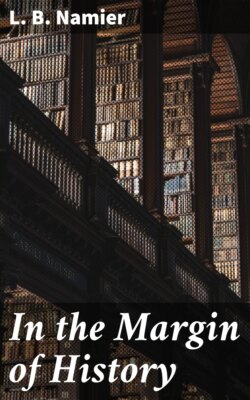Читать книгу In the Margin of History - L. B. Namier - Страница 10
На сайте Литреса книга снята с продажи.
ОглавлениеTHE POLISH CORRIDOR AND UPPER SILESIA
Table of Contents
(“Manchester Guardian,” November 7, 1933)
The problem of the Polish Corridor is not one of right against wrong; it results from a conflict of two principles, of the unity of the seaboard versus the unity of the river-basin. Which of the two should prevail? In the Middle Ages the Germans advanced quickly along the Baltic coast, with the sea for their base, and established themselves at Riga not much later than at Berlin. The Poles, on the other hand, are the nation of the Vistula, and their settlements extend from the sources of the river to its estuary; there is no other European nation centred to that extent on one single river. It is only fair that the claim of the river-basin should prevail against that of the seaboard. The Baltic joins East Prussia to Pomerania, even while the Polish Corridor intervenes between them; whereas without access to the sea Poland would be deprived of her main and most natural connexion with the outer world and of the freedom which is secured by it. The cutting through of the Corridor has meant a minor amputation for Germany; its closing up would mean strangulation for Poland.
Within the Corridor the Germans formed, according to their own census of 1910, less than half of the population; thus even numerically they had no superior claim to that territory. By 1921, according to the Polish census, the proportion of Germans had sunk to less than 21, and by December, 1931, to only 10 per cent. Some Germans undoubtedly left because they would not live under the dominion of a race which they had previously oppressed and despised; others are said to have been squeezed out by the Poles. Even if this is so, the question must be asked how many of those Germans had originally been planted artificially in that country by the Prussian Government, or why their attachment to it proved so weak and their courage and staying power so faint? No Germans in that territory were treated by the Poles with the barbarity with which tens of thousands of German citizens are now treated in Germany for reasons of race or of political opinions.
As for Upper Silesia, it is alleged on reliable authority that severe and unfair pressure, in a sense hostile to the Germans, was exercised there before and during the plebiscite, and that the frontier drawn by the League of Nations, on the supposed basis of the plebiscite, is not fair to the Germans. But if the peace settlement is to be questioned and revised, let this be done thoroughly; and my contention is that there ought never to have been a plebiscite in Upper Silesia, but that the frontier should have been drawn on the linguistic basis. Had that been done, the Poles would have obtained far more territory than they have by all the manœuvres carried out in connexion with the plebiscite.
A plebiscite is a tolerably efficient method for settling frontiers only where the national consciousness of the inhabitants is fully crystallized. In Slesvig everyone knew whether he was a German or a Dane, and the same would have held good as between, say, the Turks and the Greeks; but it was not true in Upper Silesia. In 1871, in an appeal to the Germans not to annex Alsace-Lorraine, the Polish-speaking inhabitants of Upper Silesia were quoted as example of a population whose national consciousness would never again coincide with their language; but some thirty years later the first Polish Nationalist was returned from Upper Silesia to the German Reichstag, and by 1914 there were several. At the time of the plebiscite two-thirds of the population in the area in which it was taken spoke Polish, and one-third German; but only one half of the Polish-speaking population voted for Poland. The Polish national revival in Upper Silesia was progressing steadily, but was still far from having reached its natural term in 1919. There is such a thing as a nationality in posse besides a nationality in esse, and a plebiscite is not justified in districts which are in a state of change and transition. Whatever injustice may have been committed against Germany in the execution or interpretation of the Silesian plebiscite, the plebiscite itself was an injustice against Poland.
